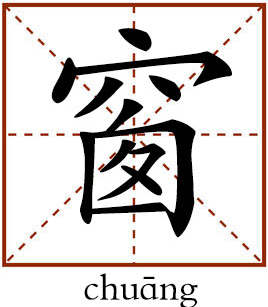Window

This character refers to windows.
何当共剪西窗烛
hé dāng gòng jiǎn xī chuāng zhú
He dang means "when" and gong "together." Jian means "to trim" and xi chuang "west window." Zhu refers to candles.
This is a line from a poem named "Written on a Rainy Night—A Letter to the North," written by the Tang poet Li Shangyin (c. 813—c. 858). "You ask me when I will come back, I do not know,/ Tonight's rain in the Ba Mountains swells the autumn pool./ When, together, will we trim the candle by the west window,/ While I tell you how I missed you on this rainy night?"
It is speculated that Li wrote this poem to his wife when he was living in Bashu, which was centered on present-day Sichuan Province in southwest China, while his wife was living in Chang'an (present-day Xi’an) in northwest China. Some people also believe that this poem is written for Li’s good friend.
The poem is condensed, packing a universe of sentiments into a single word or phrase. Without any direct expression of the author's feeling, one can feel the deep depression and loneliness of being far away from home through the first half of the poem: rain falls through the cold autumn night while Li sits alone inside his little house in the mountain, wondering when he can go back home. As the pond swells in the rain, the ceaseless drone of the rain seems to highlight his sentiments.
Usually, people continuously lament a bad situation. Here, however, instead of writing about the sadness, the poem turns to a warm scene: Li and his beloved companion—wife, soul-mate, friend—share the night and the simple tasks that make life pleasant and endearing. "While I tell you how I missed you on this rainy night" indicates that this is Li’s imagination. He hopes that this moment will happen someday in the future, and he knows he will tell his companion how he once had missed her/him on a rainy night.
This poem is a tender whisper to Li's beloved companion. Through comparing between the realistic distress and the imagined happiness, Li created an enduring atmosphere of romance in this short poem.
Edited by REN GUANHONG
